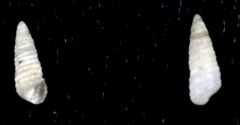Oscilla (gastropod)
| Oscilla | |
|---|---|
 | |
| Oscilla tricordata | |
| Scientific classification | |
| Kingdom: | Animalia |
| Phylum: | Mollusca |
| Class: | Gastropoda |
| (unranked): | clade Heterobranchia informal group Lower Heterobranchia |
| Superfamily: | Pyramidelloidea |
| Family: | Pyramidellidae |
| Subfamily: | Chrysallidinae |
| Genus: | Oscilla A. Adams, 1861 [1] |
| Synonyms | |
|
Miralda (Oscilla) A. Adams, 1861 | |
Oscilla is a genus of very small sea snails, minute marine gastropod mollusks or micromollusks. This genus is currently placed in the subfamily Chrysallidinae of the family Pyramidellidae. [2]
These marine gastropods have shells with intorted protoconchs.
Life history
Little is known about the biology of the members of this genus. As is true of most members of the Pyramidellidae sensu lato, they are likely to be ectoparasites.
Oscilla jocosa may possibly be a parasite on Trochus erithreus (Mienis 2003).
Species of Oscilla
The following species are mentioned in WoRMS:
- Oscilla aquilonia Pimenta, Santos & Absalao, 2008
- Oscilla ficara (Bartsch, 1915)
- Oscilla jocosa Melvill, 1904
- Oscilla notialis Pimenta, Santos & Absalao, 2008
- Oscilla tornata (A. E. Verrill, 1884)
- Oscilla tricordata (Nomura, 1938)
The following species are also mentioned in OBIS [3] and Malacolog [4]
- Oscilla annulata (A. Adams in H. & A. Adams, 1853)
- Oscilla aquilonia Pimenta, Santos & Absalao, 2008
- Oscilla beccarii (Hormung & Mermod, 1924)
- Oscilla biseriata Gabb, 1881
- Oscilla bosyuensis (Nomura, S., 1937) [5]
- Oscilla cingulata (A. Adams, 1861) (Type species) (as Monoptygma (Oscilla) cingulata)
- Oscilla circinata A. Adams, 1867 [6]
- Oscilla fallax Thiele, 1925
- Oscilla felix (Dall & Bartsch, 1906)
- Oscilla gumia
- Oscilla koheii (Nomura, 1937)
- Oscilla laquearia
- Oscilla leviplex
- Oscilla lirata (A. Adams, 1860)
- Oscilla migma
- Oscilla mutuensis (Nomura, 1938)
- Oscilla niasensis Thiele, 1925
- Oscilla obtusa (Gould, 1861 in 1859-61)
- Oscilla obtusantis (Saurin, 1961)
- Oscilla ogasaensis (Nomura, 1939)
- Oscilla ongcopensis (Saurin, 1961)
- Oscilla perfelix (Nomura, 1938)
- Oscilla pupula Thiele, 1925
- Oscilla stupa (Hori, S. & H. Fukuda, 1999) [7]
- Oscilla sumatrana Thiele, 1925
- Oscilla tempeii (Nomura, 1937)
- Oscilla voorwindei (Laseron, 1959)
- Species brought into synonymy
- Oscilla insculpta (Carpenter) Keep, 1888: synonym of Iolaea eucosmia Dall & Bartsch, 1909
- Oscilla ligata (Angas, 1877): synonym of Miralda ligata (Angas, 1877)
- Oscilla somersi (Verrill & Bush, 1900): synonym of Boonea somersi (Verrill & Bush, 1900)
The European species have been revised by van Aartsen (1994).
![]() Media related to Oscilla (gastropod) at Wikimedia Commons
Media related to Oscilla (gastropod) at Wikimedia Commons
References
- ↑ A. Adams, Zool. Proc., p. 310, 1867
- ↑ Rosenberg, G.; Gofas, S. (2011). Oscilla A. Adams, 1861. Accessed through: World Register of Marine Species at http://www.marinespecies.org/aphia.php?p=taxdetails&id=138415 on 6 July 2012
- ↑ OBIS : Miralda (Oscilla)
- ↑ Malacolog : Oscilla
- ↑ Gastropods.com: Oscilla bosyuensis; retrieved: 28 January 32012
- ↑ Dall & Bartsch, Notes on Japanese, Indo-Pacific and American Pyramidellidae; Proceedings of the U.S. National Museum, vol XXX n° 1452; 1906
- ↑ Gastropods.com: Oscilla stupa; retrieved: 28 January 2012
- Vaught, K.C. (1989). In Abbott, R.T. & Boss, K.J. (eds) A Classification of the Living Mollusca . Melbourne, Florida : American Malacologists Inc. 195 pp.
- Aartsen, J. J. van. (1994). "European Pyramidellidae: IV The Genera Eulimella, Anisocycla, Syrnola, Cingulina, Oscilla and Careliopsis.". Bollettino Malacologico 30: 85–110.
- Adams, A. (1861). "On a new genus and some new species of Pyramidellidae from the North of China". Annals and Magazine of Natural History (3) (7): 295–299.
- Mienis, H. K. (2003). "Is Oscilla jocosa an ectoparasite of Trochus erithreus? (Gastropoda, Pyramidellidae & Trochidae)". Triton 7: 1.
- Gofas, S.; Le Renard, J.; Bouchet, P. (2001). Mollusca, in: Costello, M.J. et al. (Ed.) (2001). European register of marine species: a check-list of the marine species in Europe and a bibliography of guides to their identification. Collection Patrimoines Naturels, 50: pp. 180-213